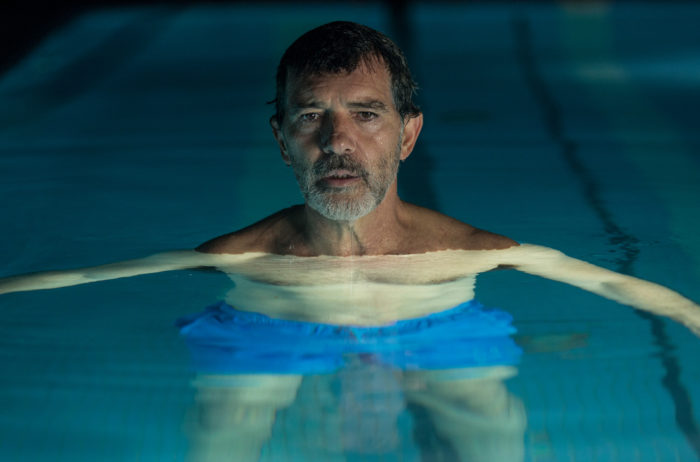Pain and Glory review: Beautifully personal drama

Review Overview
Cast
8Direction
8Memories
8Rating
David Farnor | On 19, Jun 2020
Director: Pedro Almodovar
Cast: Antonio Banderas, Asier Etxeandia, Leonardo Sbaraglia
Certificate: 15
Film and memory have always been connected – in the magical way they unspool in the present, continuous, immersive tense, in the ethereal flicker of a fleeting frame, in the unseen way they can linger and haunt your thoughts, inviting you into another nostalgic revery. From the thrill of 2000’s Memento to the evocative poignancy of 2012’s Tabu, that connection between these two related constructs has inspired some breathtaking cinema. Pain and Glory joins that list.
Pedro Almodóvar’s latest film sees the director in a quietly reflective mode, as he crafts a tale of semi-autobiographical recollections and emotions. It introduces us to Spanish director Salvador, who is undergoing a midlife crisis – one that is not only affecting his personal life and physical health, but also hindering his professional career. That creative block comes just as an earlier film – Sabor – is being re-released, one that caused Salvador to part ways with Alberto Crespo (Asier Etxeandia), his leading man and old friend.
Filmed as the actor was taking heroin, his heavy-handed performance took away the lightness the director intended – a decision that killed the movie altogether for Salvador, because, to him, existence and creativity are one and the same thing. Encouraged by another old friend, Zulema (the great Cecilia Roth), Salvador and Alberto reconnect, partly to reminisce but mostly to do drugs together.
The result triggers a wave of memories for Salvador. Leading the way is Federico (Leonardo Sbaraglia), Salvador’s former lover. Their interactions are wonderfully nuanced, shot through with a dose of regret, and they’re wittily contrasted with a monologue by Salvador based on his own memories – a monologue performed, fittingly, by Alberto. When Federico hears that performance, he and Salvador reconnect – and that inexorable, almost causational link between art and life is at the heart of Pain and Glory’s profound maturity.
Indeed, the most striking flashback sees Salvador remember moving with his mum, Jacinta (Penélope Cruz), into a cave home. While there, he agrees to teach a local builder, Eduardo (César Vicente), to read and write in exchange for free work. The resulting relationship that forms is one built on that dynamic, reinforced by the power of Eduardo being able to create and communicate his own perspective of the world – and of Salvador.
Penélope Cruz is vivacious and moving as Salvador’s mother. But the show undoubtedly belongs to Antonio Banderas, who delivers one of the best performances of his career. Where his work with Almodóvar in the past has ranged from the exotic to the disturbing, this sees Banderas on impressively understated form, as he withdraws into the introverted character.
At the helm, Almodóvar coaxes that almost invisible performance with a delicacy and nuance that has always been in his work, even when at its most colourful. That love of colour is there too, with vivid compositions and set design that delineate the wonder of a flashback and the muted reality of the present day.
There’s a beautiful melancholy to the whole endeavour – even as chuckle at Salvador’s amicable reunions – and a poignant note to remembering Salvador’s first adult love and his hidden feelings and attractions. That kind of mature perspective would normally be associated with a filmmaker’s last film, but it’s a thrill to see Almodóvar show no signs of stopping, as his most personal film to date finds inspiration and hope in the ability to capture one’s memories on tape – and use them to create new stories that, in turn, stick in the memory for years to come.
Related Posts
Netflix UK TV review: Doctor Who Season 9, Episode 9 (Sleep No More)... November 15, 2015 | Mark Harrison

VOD film review: Lunana: A Yak in the Classroom... March 10, 2023 | Matthew Turner

VOD film review: The Traitor July 28, 2020 | Bianca Garner

VOD film review: Paper Planes October 24, 2015 | Matthew Turner















